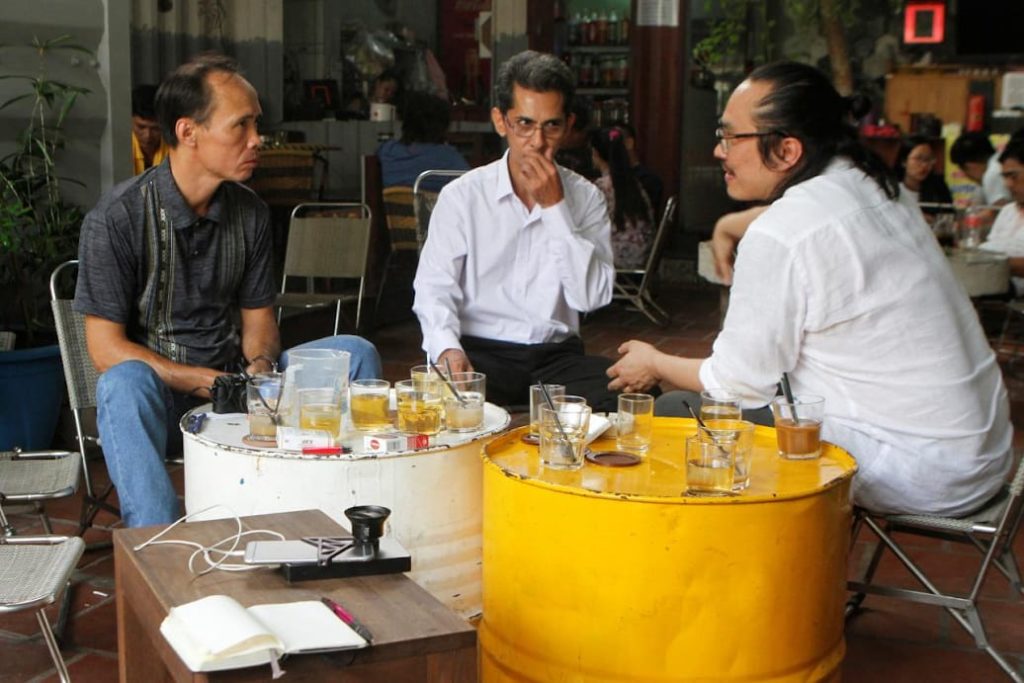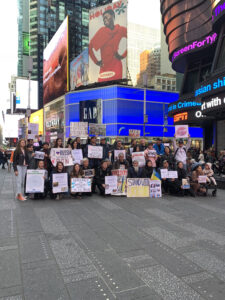Monday Briefing | April 23

 Vietnamese deportees and Amerasians Bui Thanh Hung (L) and Pham Chi Cuong (C) speak to U.S. lawyer and Vietnamese-American Tin Nguyen at a cafe in the suburbs of Ho Chi Minh City, Vietnam April 19, 2018. | Photo courtesy REUTERS/James Pearson
Vietnamese deportees and Amerasians Bui Thanh Hung (L) and Pham Chi Cuong (C) speak to U.S. lawyer and Vietnamese-American Tin Nguyen at a cafe in the suburbs of Ho Chi Minh City, Vietnam April 19, 2018. | Photo courtesy REUTERS/James Pearson
Stories to Follow
U.S.-China Trade War: In response to Chinese theft of U.S. intellectual property, in April 2018 the Trump administration released a list of 1,300 tariff lines (worth ~USD$50 billion) against China pursuant to a U.S. Trade Representative Section 301 Investigation. In response, China released its own list of tariffs against the U.S. worth USD$50b. This week, U.S. Secretary of the Treasury, Steven Mnuchin, announced that he would consider a trip to China to address the current situation. Mnuchin’s more conciliatory tone was welcomed by China. Within the administration, however, hardliners like advisor Peter Navarro prefer the current course of action in order to place pressure upon China.
The Realities of Trump Immigration Policy: This week, the Supreme Court of the United States struck down parts of the Immigration and Nationality Act that it found to be “unconstitutionally vague.” In practice, this limits the kinds of crimes committed by lawful permanent residents that would necessitate mandatory deportation. Just prior to this, Reuters conducted a report on the daily life of Vietnamese deported as a part of Trump’s push to remove immigrants convicted of crimes in the U.S. This is a unique case, as many of those designated for deportation came to the United States before 1995—likely as refugees following the end of the war in 1975. These individuals are also technically protected under a 2008 bilateral agreement between the U.S. and Vietnam. Once returned to Vietnam individuals like Bui Thanh Hung face suspicion and hardship, reflecting that “Over here, I have no job, no one to support me, no house to live in.” Similarly, refugees of Cambodian descent living in America for their whole lives have been deported back to a country they do not know and where they do not speak the language. “This ain’t home,” Khan Hin says, “America’s my home.”
Syria Bombing: On April 13, the U.S., France, and the U.K. conducted coordinated bombing strikes on chemical weapons facilities in Syria. The strikes hit the Barzah Research and Development Center and the Him Shinshar chemical weapons facility, setting back Syrian chemical weapons capabilities “for years,” according to internal U.S. assessments. This followed a chemical gas attack in rebel-held Douma by Syrian government forces. According to administration officials, President Trump’s decision to take military action was partially prompted by his desire to back up his own tweets with a show of force.
This Week in JPI
New Developments on the Stagnant Nagorno-Karabakh Conflict by Anthony Branch: The Nagorno-Karabakh has been a source of conflict between Armenia and Azerbaijan since 1988, when the government of the region declared its secession from the Republic of Azerbaijan. Armenia has supported the de facto state and holds military control over the territory. Azerbaijan promises to take back the land, by force if necessary. The conflict escalated into open war from 1992–1994, but Russia brokered a ceasefire which the states have generally respected, though there continue to be occasional violations of the agreement.
Happening This Week
Data and Democracy: The European Union and Cambridge Analytica | Tuesday, April 26, 6:45–8:30PM | 19 University Place, Great Room
In light of the increasing relevance to international relations of the EU General Data Protection Regulation, please join James Felton Keith, Chairman of the International Personal Data Trade Association, and Omar Jagne, CEO, MOVAAR, The Gambia, in a panel discussion moderated by Dr. Colette Mazzucelli, NYU New York, about the evolution of personal data and the developments leading to the Cambridge Analytica scandal involving questionable access to the private information of more than two billion Facebook users.
In Your Free Time
This Is Our Land closely mirrors current French politics—namely the far-nationalism of Marine Le Pen’s Front National. In the film, a working-class, single mother in Northern France runs for mayor on the wave of populist rhetoric. More info here.
Now that nice weather is finally (maybe?!) here, take a short hike up Fort Tryon Park to the Metropolitan Museum of Art’s Cloisters. The Cloisters contains a breathtaking collection of medieval European art, architecture, and gardens. More info here.
This week’s Monday Briefing is brought to you by Andrew Keough.







